Global Branding Strategy of Organic Coffee in UK: Nestle Case Study
VerifiedAdded on 2023/01/19
|11
|3060
|90
Report
AI Summary
This research project investigates the global branding strategy of organic coffee in the UK, using Nestle as a case study. The introduction defines global branding and its importance, setting the stage for an analysis of the UK market. Task 1 includes a research proposal with a clear research question: 'To develop global branding strategies for driving growth of organic coffee in UK market'. The objectives focus on the health benefits of organic coffee, key market factors, and effective brand strategies. The literature review explores the health benefits and quality of organic coffee, highlighting reduced risks of chronic diseases and the absence of harmful chemicals. It also examines key drivers for organic coffee growth, such as increasing consumer demand and environmental awareness. Furthermore, the report discusses global brand strategies, emphasizing market segmentation and building relationships with key players like Costa Coffee and Starbucks. The methodology section outlines research methods, including quantitative and qualitative approaches to data collection and analysis. The report underscores the significance of understanding consumer behavior and preferences in the UK market to develop effective branding strategies for organic coffee.
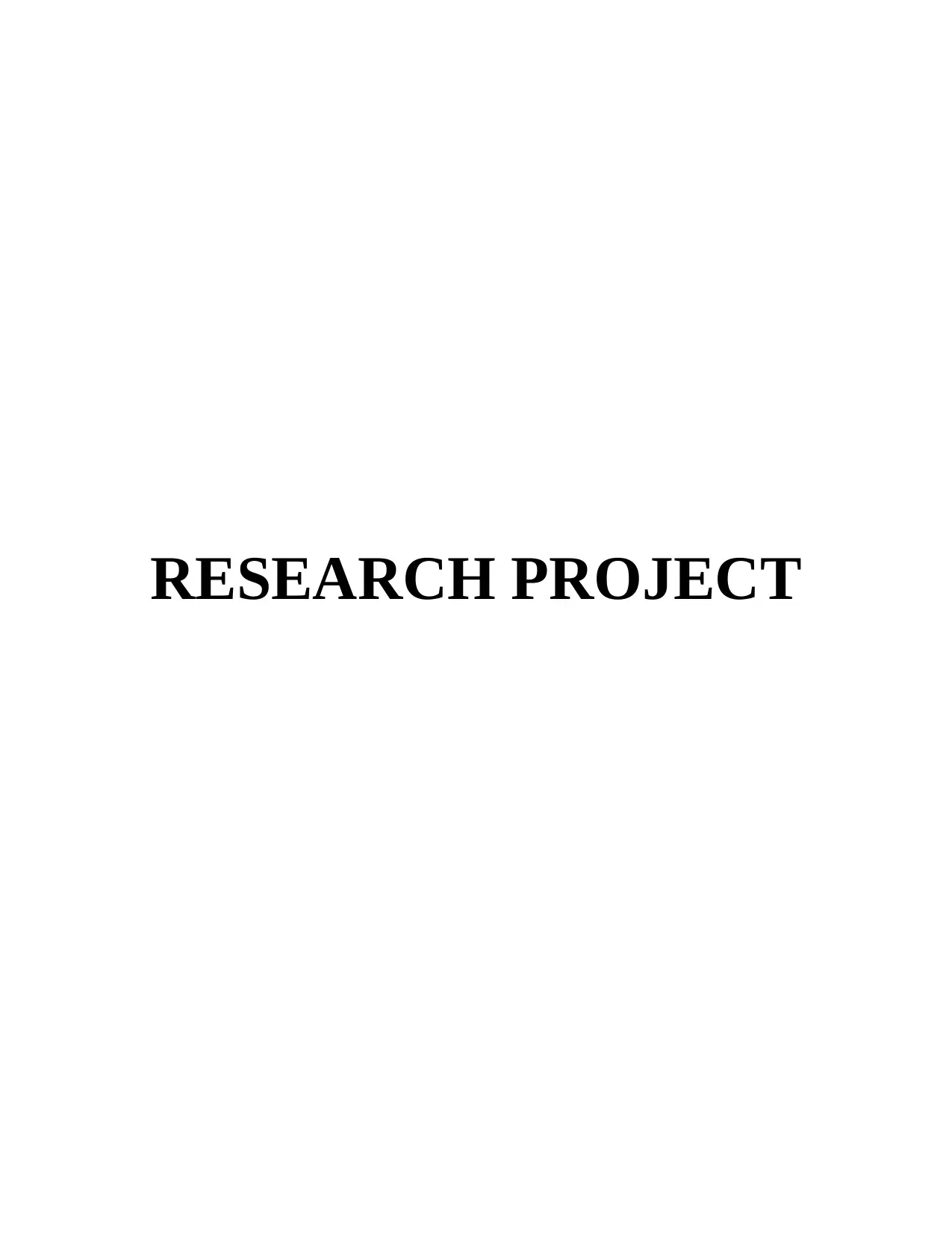
RESEARCH PROJECT
Paraphrase This Document
Need a fresh take? Get an instant paraphrase of this document with our AI Paraphraser
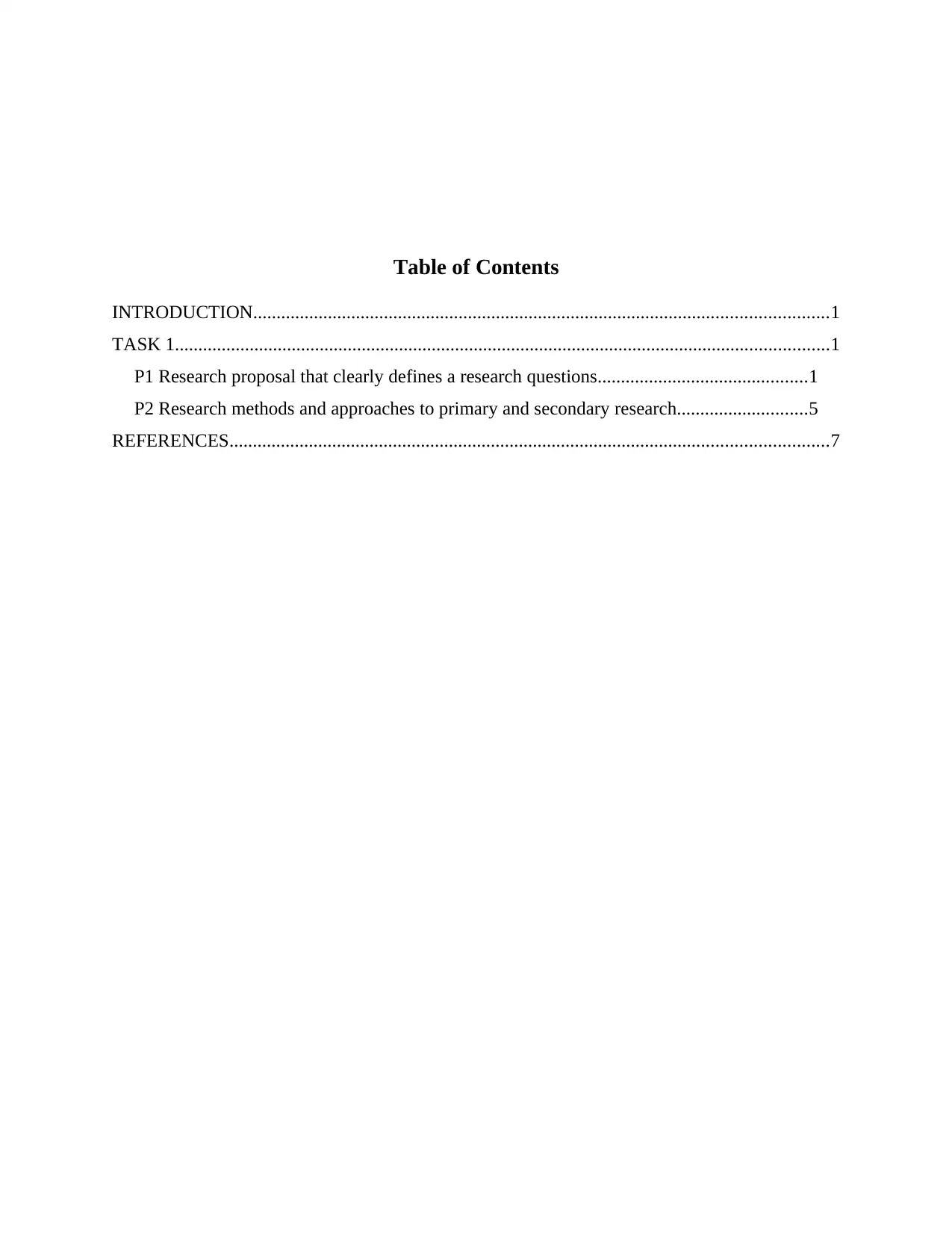
Table of Contents
INTRODUCTION...........................................................................................................................1
TASK 1............................................................................................................................................1
P1 Research proposal that clearly defines a research questions.............................................1
P2 Research methods and approaches to primary and secondary research............................5
REFERENCES................................................................................................................................7
INTRODUCTION...........................................................................................................................1
TASK 1............................................................................................................................................1
P1 Research proposal that clearly defines a research questions.............................................1
P2 Research methods and approaches to primary and secondary research............................5
REFERENCES................................................................................................................................7
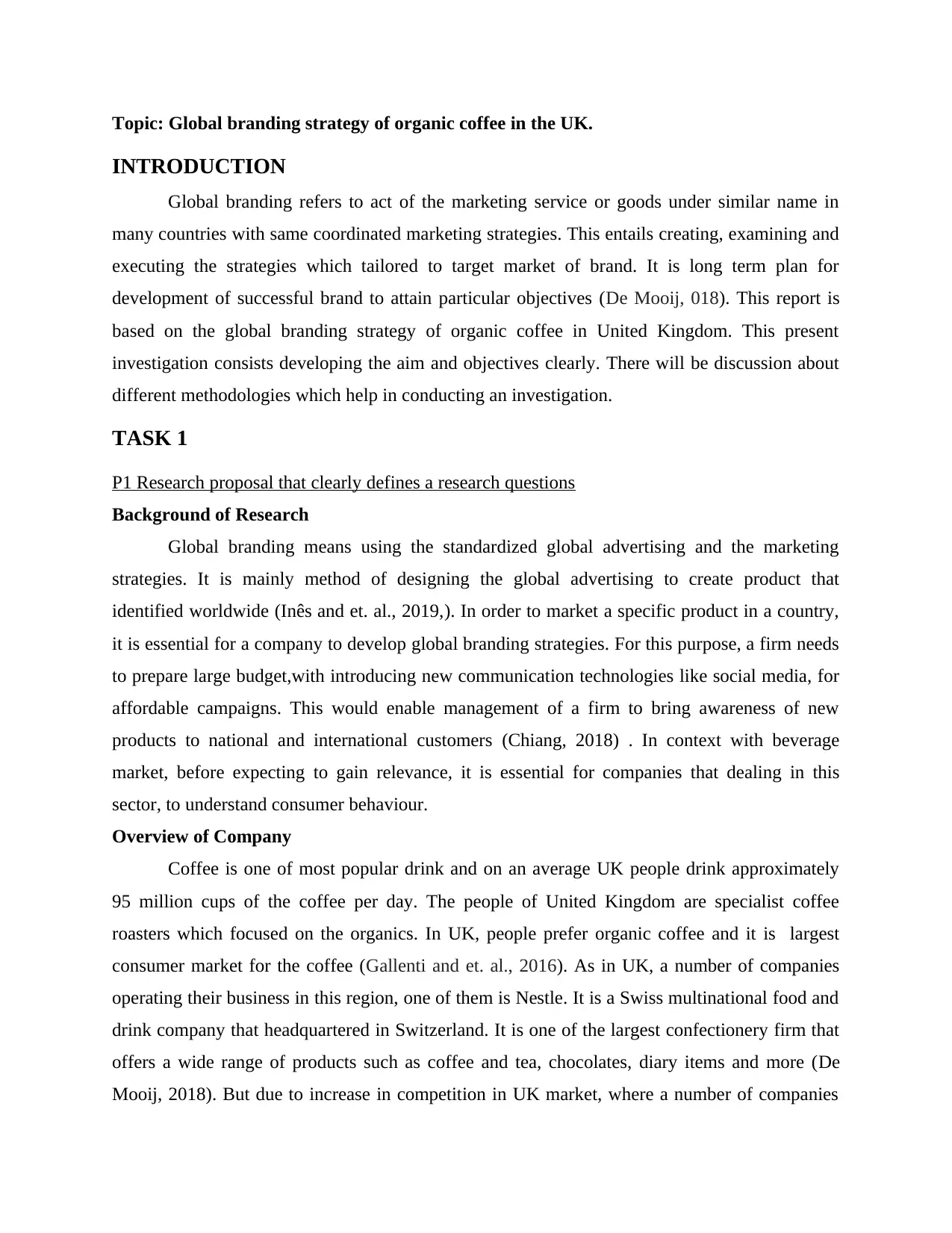
Topic: Global branding strategy of organic coffee in the UK.
INTRODUCTION
Global branding refers to act of the marketing service or goods under similar name in
many countries with same coordinated marketing strategies. This entails creating, examining and
executing the strategies which tailored to target market of brand. It is long term plan for
development of successful brand to attain particular objectives (De Mooij, 018). This report is
based on the global branding strategy of organic coffee in United Kingdom. This present
investigation consists developing the aim and objectives clearly. There will be discussion about
different methodologies which help in conducting an investigation.
TASK 1
P1 Research proposal that clearly defines a research questions
Background of Research
Global branding means using the standardized global advertising and the marketing
strategies. It is mainly method of designing the global advertising to create product that
identified worldwide (Inês and et. al., 2019,). In order to market a specific product in a country,
it is essential for a company to develop global branding strategies. For this purpose, a firm needs
to prepare large budget,with introducing new communication technologies like social media, for
affordable campaigns. This would enable management of a firm to bring awareness of new
products to national and international customers (Chiang, 2018) . In context with beverage
market, before expecting to gain relevance, it is essential for companies that dealing in this
sector, to understand consumer behaviour.
Overview of Company
Coffee is one of most popular drink and on an average UK people drink approximately
95 million cups of the coffee per day. The people of United Kingdom are specialist coffee
roasters which focused on the organics. In UK, people prefer organic coffee and it is largest
consumer market for the coffee (Gallenti and et. al., 2016). As in UK, a number of companies
operating their business in this region, one of them is Nestle. It is a Swiss multinational food and
drink company that headquartered in Switzerland. It is one of the largest confectionery firm that
offers a wide range of products such as coffee and tea, chocolates, diary items and more (De
Mooij, 2018). But due to increase in competition in UK market, where a number of companies
INTRODUCTION
Global branding refers to act of the marketing service or goods under similar name in
many countries with same coordinated marketing strategies. This entails creating, examining and
executing the strategies which tailored to target market of brand. It is long term plan for
development of successful brand to attain particular objectives (De Mooij, 018). This report is
based on the global branding strategy of organic coffee in United Kingdom. This present
investigation consists developing the aim and objectives clearly. There will be discussion about
different methodologies which help in conducting an investigation.
TASK 1
P1 Research proposal that clearly defines a research questions
Background of Research
Global branding means using the standardized global advertising and the marketing
strategies. It is mainly method of designing the global advertising to create product that
identified worldwide (Inês and et. al., 2019,). In order to market a specific product in a country,
it is essential for a company to develop global branding strategies. For this purpose, a firm needs
to prepare large budget,with introducing new communication technologies like social media, for
affordable campaigns. This would enable management of a firm to bring awareness of new
products to national and international customers (Chiang, 2018) . In context with beverage
market, before expecting to gain relevance, it is essential for companies that dealing in this
sector, to understand consumer behaviour.
Overview of Company
Coffee is one of most popular drink and on an average UK people drink approximately
95 million cups of the coffee per day. The people of United Kingdom are specialist coffee
roasters which focused on the organics. In UK, people prefer organic coffee and it is largest
consumer market for the coffee (Gallenti and et. al., 2016). As in UK, a number of companies
operating their business in this region, one of them is Nestle. It is a Swiss multinational food and
drink company that headquartered in Switzerland. It is one of the largest confectionery firm that
offers a wide range of products such as coffee and tea, chocolates, diary items and more (De
Mooij, 2018). But due to increase in competition in UK market, where a number of companies
⊘ This is a preview!⊘
Do you want full access?
Subscribe today to unlock all pages.

Trusted by 1+ million students worldwide
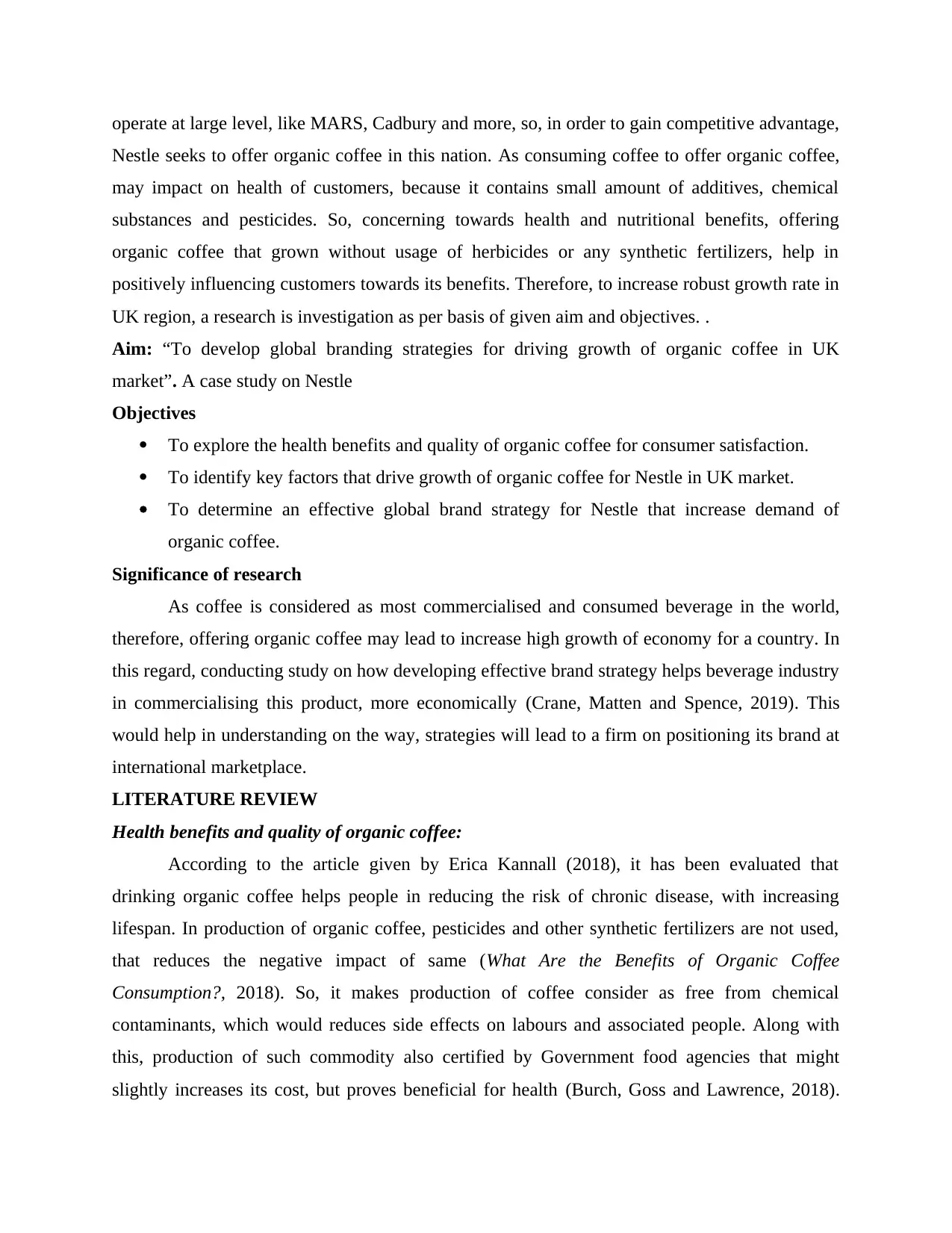
operate at large level, like MARS, Cadbury and more, so, in order to gain competitive advantage,
Nestle seeks to offer organic coffee in this nation. As consuming coffee to offer organic coffee,
may impact on health of customers, because it contains small amount of additives, chemical
substances and pesticides. So, concerning towards health and nutritional benefits, offering
organic coffee that grown without usage of herbicides or any synthetic fertilizers, help in
positively influencing customers towards its benefits. Therefore, to increase robust growth rate in
UK region, a research is investigation as per basis of given aim and objectives. .
Aim: “To develop global branding strategies for driving growth of organic coffee in UK
market”. A case study on Nestle
Objectives
To explore the health benefits and quality of organic coffee for consumer satisfaction.
To identify key factors that drive growth of organic coffee for Nestle in UK market.
To determine an effective global brand strategy for Nestle that increase demand of
organic coffee.
Significance of research
As coffee is considered as most commercialised and consumed beverage in the world,
therefore, offering organic coffee may lead to increase high growth of economy for a country. In
this regard, conducting study on how developing effective brand strategy helps beverage industry
in commercialising this product, more economically (Crane, Matten and Spence, 2019). This
would help in understanding on the way, strategies will lead to a firm on positioning its brand at
international marketplace.
LITERATURE REVIEW
Health benefits and quality of organic coffee:
According to the article given by Erica Kannall (2018), it has been evaluated that
drinking organic coffee helps people in reducing the risk of chronic disease, with increasing
lifespan. In production of organic coffee, pesticides and other synthetic fertilizers are not used,
that reduces the negative impact of same (What Are the Benefits of Organic Coffee
Consumption?, 2018). So, it makes production of coffee consider as free from chemical
contaminants, which would reduces side effects on labours and associated people. Along with
this, production of such commodity also certified by Government food agencies that might
slightly increases its cost, but proves beneficial for health (Burch, Goss and Lawrence, 2018).
Nestle seeks to offer organic coffee in this nation. As consuming coffee to offer organic coffee,
may impact on health of customers, because it contains small amount of additives, chemical
substances and pesticides. So, concerning towards health and nutritional benefits, offering
organic coffee that grown without usage of herbicides or any synthetic fertilizers, help in
positively influencing customers towards its benefits. Therefore, to increase robust growth rate in
UK region, a research is investigation as per basis of given aim and objectives. .
Aim: “To develop global branding strategies for driving growth of organic coffee in UK
market”. A case study on Nestle
Objectives
To explore the health benefits and quality of organic coffee for consumer satisfaction.
To identify key factors that drive growth of organic coffee for Nestle in UK market.
To determine an effective global brand strategy for Nestle that increase demand of
organic coffee.
Significance of research
As coffee is considered as most commercialised and consumed beverage in the world,
therefore, offering organic coffee may lead to increase high growth of economy for a country. In
this regard, conducting study on how developing effective brand strategy helps beverage industry
in commercialising this product, more economically (Crane, Matten and Spence, 2019). This
would help in understanding on the way, strategies will lead to a firm on positioning its brand at
international marketplace.
LITERATURE REVIEW
Health benefits and quality of organic coffee:
According to the article given by Erica Kannall (2018), it has been evaluated that
drinking organic coffee helps people in reducing the risk of chronic disease, with increasing
lifespan. In production of organic coffee, pesticides and other synthetic fertilizers are not used,
that reduces the negative impact of same (What Are the Benefits of Organic Coffee
Consumption?, 2018). So, it makes production of coffee consider as free from chemical
contaminants, which would reduces side effects on labours and associated people. Along with
this, production of such commodity also certified by Government food agencies that might
slightly increases its cost, but proves beneficial for health (Burch, Goss and Lawrence, 2018).
Paraphrase This Document
Need a fresh take? Get an instant paraphrase of this document with our AI Paraphraser
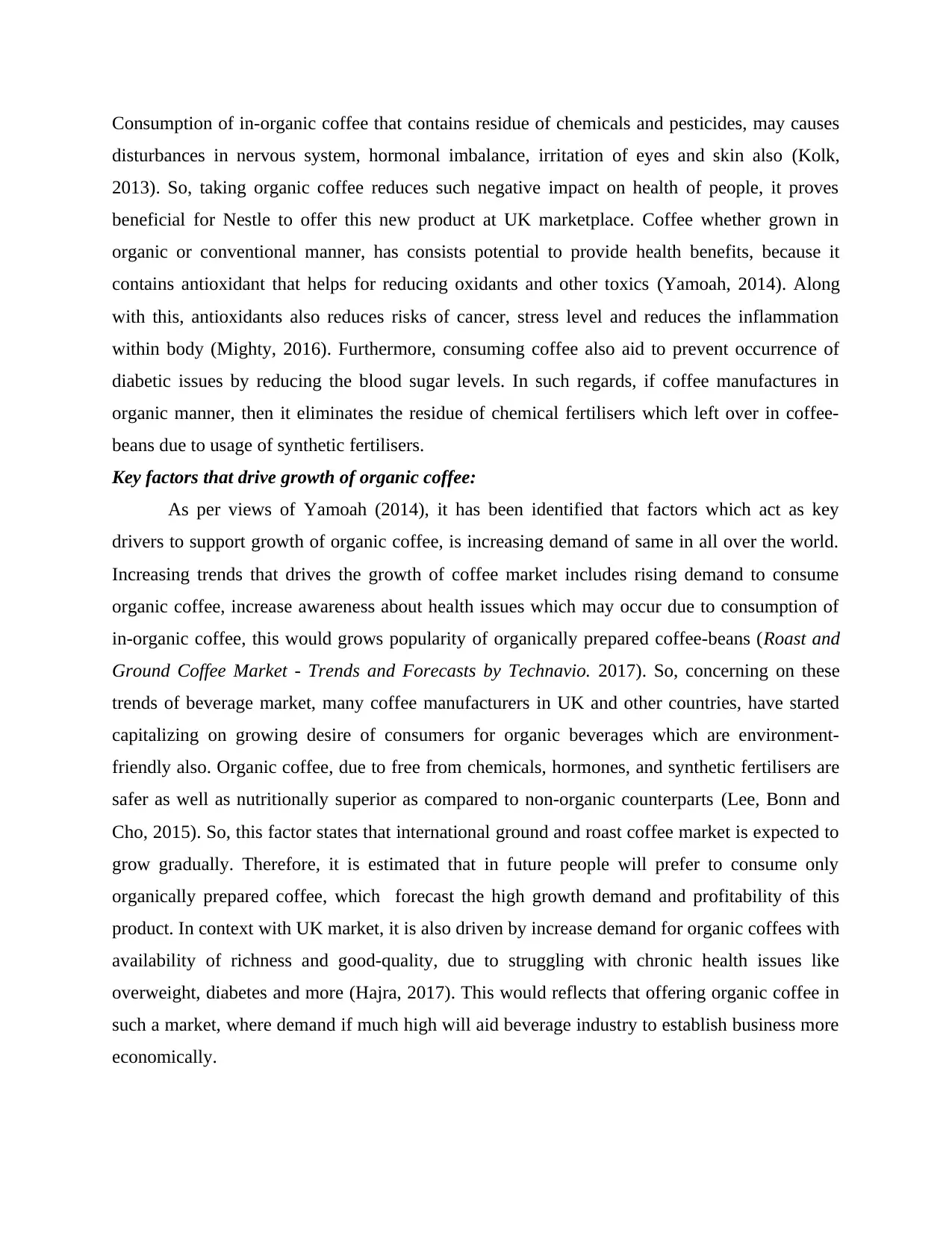
Consumption of in-organic coffee that contains residue of chemicals and pesticides, may causes
disturbances in nervous system, hormonal imbalance, irritation of eyes and skin also (Kolk,
2013). So, taking organic coffee reduces such negative impact on health of people, it proves
beneficial for Nestle to offer this new product at UK marketplace. Coffee whether grown in
organic or conventional manner, has consists potential to provide health benefits, because it
contains antioxidant that helps for reducing oxidants and other toxics (Yamoah, 2014). Along
with this, antioxidants also reduces risks of cancer, stress level and reduces the inflammation
within body (Mighty, 2016). Furthermore, consuming coffee also aid to prevent occurrence of
diabetic issues by reducing the blood sugar levels. In such regards, if coffee manufactures in
organic manner, then it eliminates the residue of chemical fertilisers which left over in coffee-
beans due to usage of synthetic fertilisers.
Key factors that drive growth of organic coffee:
As per views of Yamoah (2014), it has been identified that factors which act as key
drivers to support growth of organic coffee, is increasing demand of same in all over the world.
Increasing trends that drives the growth of coffee market includes rising demand to consume
organic coffee, increase awareness about health issues which may occur due to consumption of
in-organic coffee, this would grows popularity of organically prepared coffee-beans (Roast and
Ground Coffee Market - Trends and Forecasts by Technavio. 2017). So, concerning on these
trends of beverage market, many coffee manufacturers in UK and other countries, have started
capitalizing on growing desire of consumers for organic beverages which are environment-
friendly also. Organic coffee, due to free from chemicals, hormones, and synthetic fertilisers are
safer as well as nutritionally superior as compared to non-organic counterparts (Lee, Bonn and
Cho, 2015). So, this factor states that international ground and roast coffee market is expected to
grow gradually. Therefore, it is estimated that in future people will prefer to consume only
organically prepared coffee, which forecast the high growth demand and profitability of this
product. In context with UK market, it is also driven by increase demand for organic coffees with
availability of richness and good-quality, due to struggling with chronic health issues like
overweight, diabetes and more (Hajra, 2017). This would reflects that offering organic coffee in
such a market, where demand if much high will aid beverage industry to establish business more
economically.
disturbances in nervous system, hormonal imbalance, irritation of eyes and skin also (Kolk,
2013). So, taking organic coffee reduces such negative impact on health of people, it proves
beneficial for Nestle to offer this new product at UK marketplace. Coffee whether grown in
organic or conventional manner, has consists potential to provide health benefits, because it
contains antioxidant that helps for reducing oxidants and other toxics (Yamoah, 2014). Along
with this, antioxidants also reduces risks of cancer, stress level and reduces the inflammation
within body (Mighty, 2016). Furthermore, consuming coffee also aid to prevent occurrence of
diabetic issues by reducing the blood sugar levels. In such regards, if coffee manufactures in
organic manner, then it eliminates the residue of chemical fertilisers which left over in coffee-
beans due to usage of synthetic fertilisers.
Key factors that drive growth of organic coffee:
As per views of Yamoah (2014), it has been identified that factors which act as key
drivers to support growth of organic coffee, is increasing demand of same in all over the world.
Increasing trends that drives the growth of coffee market includes rising demand to consume
organic coffee, increase awareness about health issues which may occur due to consumption of
in-organic coffee, this would grows popularity of organically prepared coffee-beans (Roast and
Ground Coffee Market - Trends and Forecasts by Technavio. 2017). So, concerning on these
trends of beverage market, many coffee manufacturers in UK and other countries, have started
capitalizing on growing desire of consumers for organic beverages which are environment-
friendly also. Organic coffee, due to free from chemicals, hormones, and synthetic fertilisers are
safer as well as nutritionally superior as compared to non-organic counterparts (Lee, Bonn and
Cho, 2015). So, this factor states that international ground and roast coffee market is expected to
grow gradually. Therefore, it is estimated that in future people will prefer to consume only
organically prepared coffee, which forecast the high growth demand and profitability of this
product. In context with UK market, it is also driven by increase demand for organic coffees with
availability of richness and good-quality, due to struggling with chronic health issues like
overweight, diabetes and more (Hajra, 2017). This would reflects that offering organic coffee in
such a market, where demand if much high will aid beverage industry to establish business more
economically.
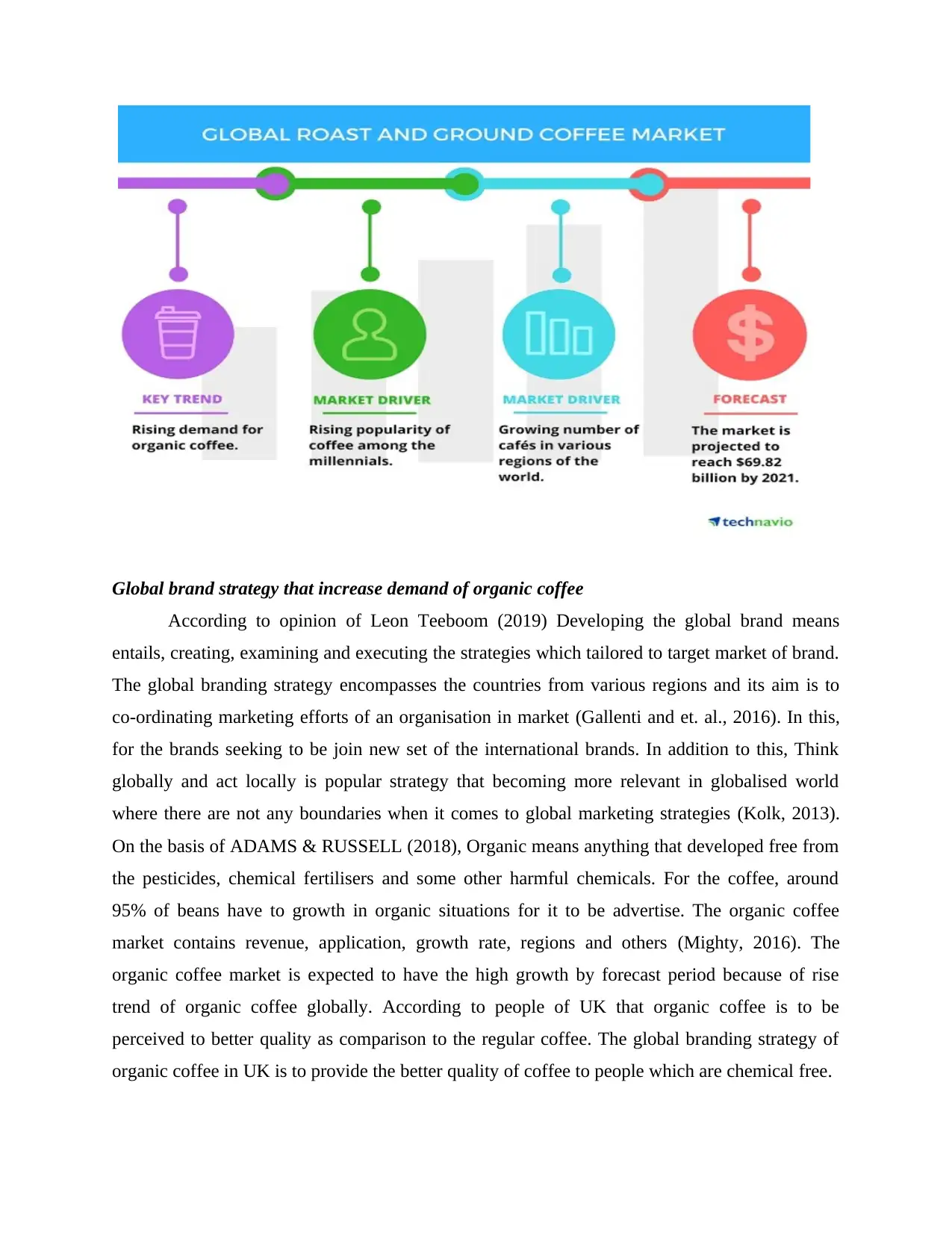
Global brand strategy that increase demand of organic coffee
According to opinion of Leon Teeboom (2019) Developing the global brand means
entails, creating, examining and executing the strategies which tailored to target market of brand.
The global branding strategy encompasses the countries from various regions and its aim is to
co-ordinating marketing efforts of an organisation in market (Gallenti and et. al., 2016). In this,
for the brands seeking to be join new set of the international brands. In addition to this, Think
globally and act locally is popular strategy that becoming more relevant in globalised world
where there are not any boundaries when it comes to global marketing strategies (Kolk, 2013).
On the basis of ADAMS & RUSSELL (2018), Organic means anything that developed free from
the pesticides, chemical fertilisers and some other harmful chemicals. For the coffee, around
95% of beans have to growth in organic situations for it to be advertise. The organic coffee
market contains revenue, application, growth rate, regions and others (Mighty, 2016). The
organic coffee market is expected to have the high growth by forecast period because of rise
trend of organic coffee globally. According to people of UK that organic coffee is to be
perceived to better quality as comparison to the regular coffee. The global branding strategy of
organic coffee in UK is to provide the better quality of coffee to people which are chemical free.
According to opinion of Leon Teeboom (2019) Developing the global brand means
entails, creating, examining and executing the strategies which tailored to target market of brand.
The global branding strategy encompasses the countries from various regions and its aim is to
co-ordinating marketing efforts of an organisation in market (Gallenti and et. al., 2016). In this,
for the brands seeking to be join new set of the international brands. In addition to this, Think
globally and act locally is popular strategy that becoming more relevant in globalised world
where there are not any boundaries when it comes to global marketing strategies (Kolk, 2013).
On the basis of ADAMS & RUSSELL (2018), Organic means anything that developed free from
the pesticides, chemical fertilisers and some other harmful chemicals. For the coffee, around
95% of beans have to growth in organic situations for it to be advertise. The organic coffee
market contains revenue, application, growth rate, regions and others (Mighty, 2016). The
organic coffee market is expected to have the high growth by forecast period because of rise
trend of organic coffee globally. According to people of UK that organic coffee is to be
perceived to better quality as comparison to the regular coffee. The global branding strategy of
organic coffee in UK is to provide the better quality of coffee to people which are chemical free.
⊘ This is a preview!⊘
Do you want full access?
Subscribe today to unlock all pages.

Trusted by 1+ million students worldwide
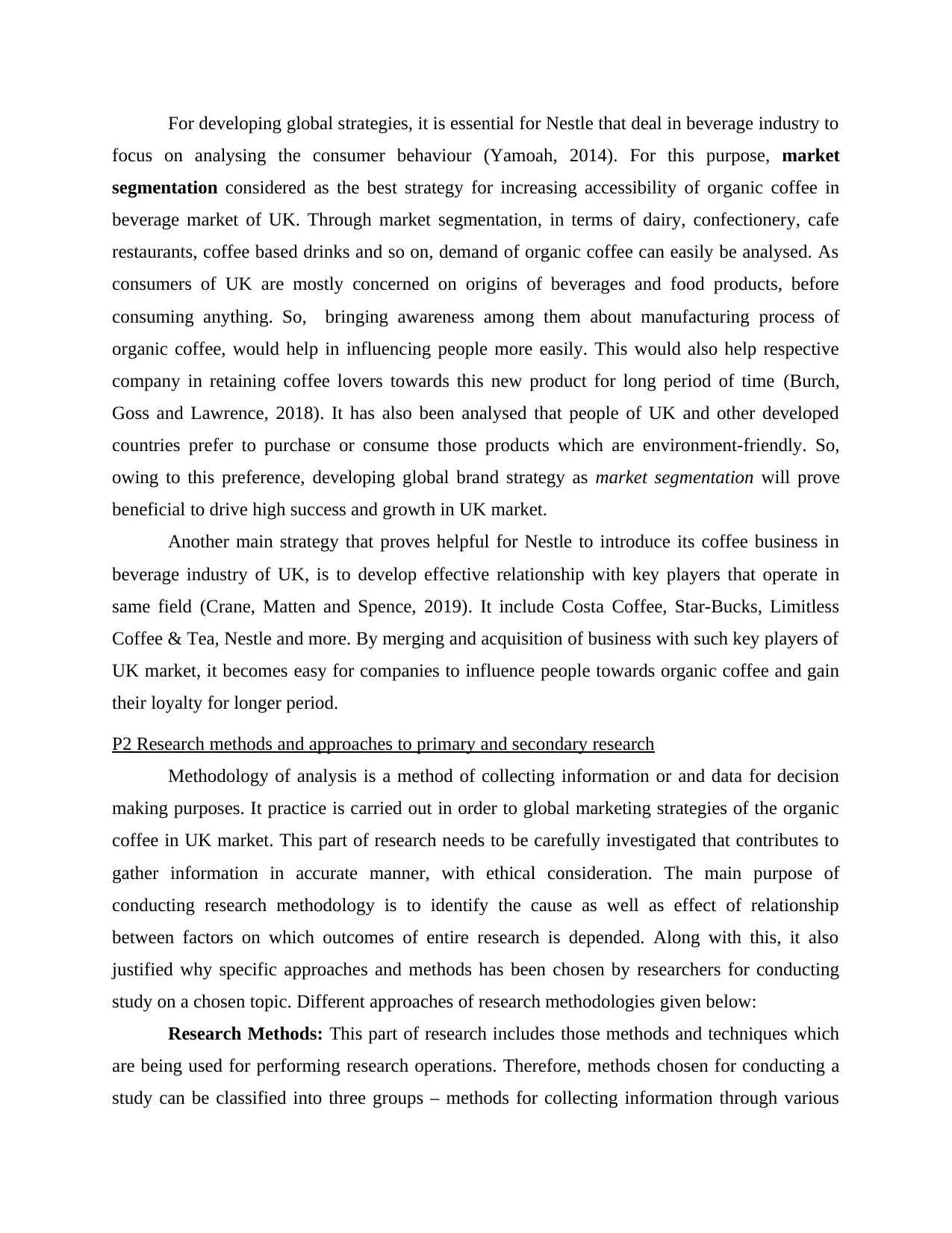
For developing global strategies, it is essential for Nestle that deal in beverage industry to
focus on analysing the consumer behaviour (Yamoah, 2014). For this purpose, market
segmentation considered as the best strategy for increasing accessibility of organic coffee in
beverage market of UK. Through market segmentation, in terms of dairy, confectionery, cafe
restaurants, coffee based drinks and so on, demand of organic coffee can easily be analysed. As
consumers of UK are mostly concerned on origins of beverages and food products, before
consuming anything. So, bringing awareness among them about manufacturing process of
organic coffee, would help in influencing people more easily. This would also help respective
company in retaining coffee lovers towards this new product for long period of time (Burch,
Goss and Lawrence, 2018). It has also been analysed that people of UK and other developed
countries prefer to purchase or consume those products which are environment-friendly. So,
owing to this preference, developing global brand strategy as market segmentation will prove
beneficial to drive high success and growth in UK market.
Another main strategy that proves helpful for Nestle to introduce its coffee business in
beverage industry of UK, is to develop effective relationship with key players that operate in
same field (Crane, Matten and Spence, 2019). It include Costa Coffee, Star-Bucks, Limitless
Coffee & Tea, Nestle and more. By merging and acquisition of business with such key players of
UK market, it becomes easy for companies to influence people towards organic coffee and gain
their loyalty for longer period.
P2 Research methods and approaches to primary and secondary research
Methodology of analysis is a method of collecting information or and data for decision
making purposes. It practice is carried out in order to global marketing strategies of the organic
coffee in UK market. This part of research needs to be carefully investigated that contributes to
gather information in accurate manner, with ethical consideration. The main purpose of
conducting research methodology is to identify the cause as well as effect of relationship
between factors on which outcomes of entire research is depended. Along with this, it also
justified why specific approaches and methods has been chosen by researchers for conducting
study on a chosen topic. Different approaches of research methodologies given below:
Research Methods: This part of research includes those methods and techniques which
are being used for performing research operations. Therefore, methods chosen for conducting a
study can be classified into three groups – methods for collecting information through various
focus on analysing the consumer behaviour (Yamoah, 2014). For this purpose, market
segmentation considered as the best strategy for increasing accessibility of organic coffee in
beverage market of UK. Through market segmentation, in terms of dairy, confectionery, cafe
restaurants, coffee based drinks and so on, demand of organic coffee can easily be analysed. As
consumers of UK are mostly concerned on origins of beverages and food products, before
consuming anything. So, bringing awareness among them about manufacturing process of
organic coffee, would help in influencing people more easily. This would also help respective
company in retaining coffee lovers towards this new product for long period of time (Burch,
Goss and Lawrence, 2018). It has also been analysed that people of UK and other developed
countries prefer to purchase or consume those products which are environment-friendly. So,
owing to this preference, developing global brand strategy as market segmentation will prove
beneficial to drive high success and growth in UK market.
Another main strategy that proves helpful for Nestle to introduce its coffee business in
beverage industry of UK, is to develop effective relationship with key players that operate in
same field (Crane, Matten and Spence, 2019). It include Costa Coffee, Star-Bucks, Limitless
Coffee & Tea, Nestle and more. By merging and acquisition of business with such key players of
UK market, it becomes easy for companies to influence people towards organic coffee and gain
their loyalty for longer period.
P2 Research methods and approaches to primary and secondary research
Methodology of analysis is a method of collecting information or and data for decision
making purposes. It practice is carried out in order to global marketing strategies of the organic
coffee in UK market. This part of research needs to be carefully investigated that contributes to
gather information in accurate manner, with ethical consideration. The main purpose of
conducting research methodology is to identify the cause as well as effect of relationship
between factors on which outcomes of entire research is depended. Along with this, it also
justified why specific approaches and methods has been chosen by researchers for conducting
study on a chosen topic. Different approaches of research methodologies given below:
Research Methods: This part of research includes those methods and techniques which
are being used for performing research operations. Therefore, methods chosen for conducting a
study can be classified into three groups – methods for collecting information through various
Paraphrase This Document
Need a fresh take? Get an instant paraphrase of this document with our AI Paraphraser
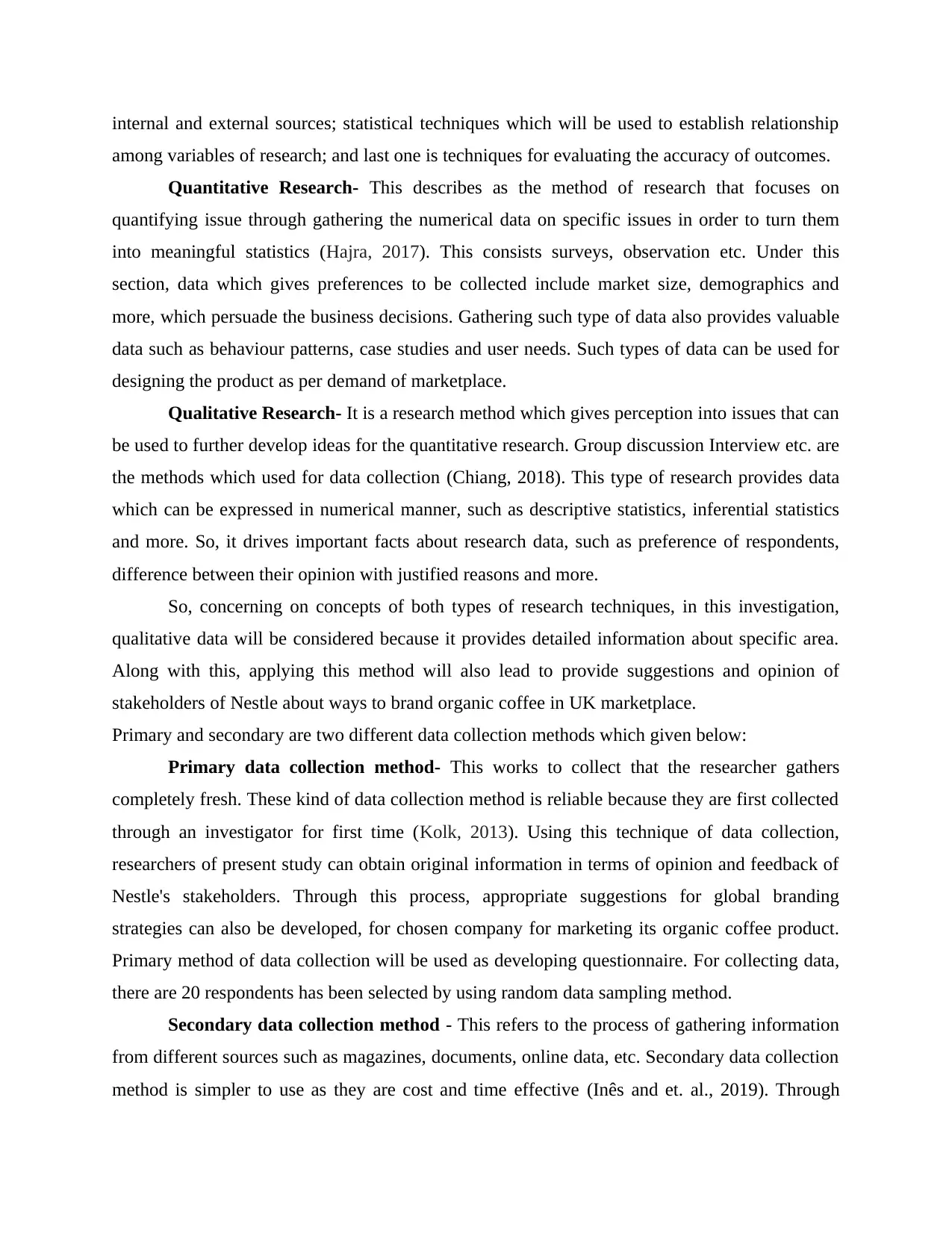
internal and external sources; statistical techniques which will be used to establish relationship
among variables of research; and last one is techniques for evaluating the accuracy of outcomes.
Quantitative Research- This describes as the method of research that focuses on
quantifying issue through gathering the numerical data on specific issues in order to turn them
into meaningful statistics (Hajra, 2017). This consists surveys, observation etc. Under this
section, data which gives preferences to be collected include market size, demographics and
more, which persuade the business decisions. Gathering such type of data also provides valuable
data such as behaviour patterns, case studies and user needs. Such types of data can be used for
designing the product as per demand of marketplace.
Qualitative Research- It is a research method which gives perception into issues that can
be used to further develop ideas for the quantitative research. Group discussion Interview etc. are
the methods which used for data collection (Chiang, 2018). This type of research provides data
which can be expressed in numerical manner, such as descriptive statistics, inferential statistics
and more. So, it drives important facts about research data, such as preference of respondents,
difference between their opinion with justified reasons and more.
So, concerning on concepts of both types of research techniques, in this investigation,
qualitative data will be considered because it provides detailed information about specific area.
Along with this, applying this method will also lead to provide suggestions and opinion of
stakeholders of Nestle about ways to brand organic coffee in UK marketplace.
Primary and secondary are two different data collection methods which given below:
Primary data collection method- This works to collect that the researcher gathers
completely fresh. These kind of data collection method is reliable because they are first collected
through an investigator for first time (Kolk, 2013). Using this technique of data collection,
researchers of present study can obtain original information in terms of opinion and feedback of
Nestle's stakeholders. Through this process, appropriate suggestions for global branding
strategies can also be developed, for chosen company for marketing its organic coffee product.
Primary method of data collection will be used as developing questionnaire. For collecting data,
there are 20 respondents has been selected by using random data sampling method.
Secondary data collection method - This refers to the process of gathering information
from different sources such as magazines, documents, online data, etc. Secondary data collection
method is simpler to use as they are cost and time effective (Inês and et. al., 2019). Through
among variables of research; and last one is techniques for evaluating the accuracy of outcomes.
Quantitative Research- This describes as the method of research that focuses on
quantifying issue through gathering the numerical data on specific issues in order to turn them
into meaningful statistics (Hajra, 2017). This consists surveys, observation etc. Under this
section, data which gives preferences to be collected include market size, demographics and
more, which persuade the business decisions. Gathering such type of data also provides valuable
data such as behaviour patterns, case studies and user needs. Such types of data can be used for
designing the product as per demand of marketplace.
Qualitative Research- It is a research method which gives perception into issues that can
be used to further develop ideas for the quantitative research. Group discussion Interview etc. are
the methods which used for data collection (Chiang, 2018). This type of research provides data
which can be expressed in numerical manner, such as descriptive statistics, inferential statistics
and more. So, it drives important facts about research data, such as preference of respondents,
difference between their opinion with justified reasons and more.
So, concerning on concepts of both types of research techniques, in this investigation,
qualitative data will be considered because it provides detailed information about specific area.
Along with this, applying this method will also lead to provide suggestions and opinion of
stakeholders of Nestle about ways to brand organic coffee in UK marketplace.
Primary and secondary are two different data collection methods which given below:
Primary data collection method- This works to collect that the researcher gathers
completely fresh. These kind of data collection method is reliable because they are first collected
through an investigator for first time (Kolk, 2013). Using this technique of data collection,
researchers of present study can obtain original information in terms of opinion and feedback of
Nestle's stakeholders. Through this process, appropriate suggestions for global branding
strategies can also be developed, for chosen company for marketing its organic coffee product.
Primary method of data collection will be used as developing questionnaire. For collecting data,
there are 20 respondents has been selected by using random data sampling method.
Secondary data collection method - This refers to the process of gathering information
from different sources such as magazines, documents, online data, etc. Secondary data collection
method is simpler to use as they are cost and time effective (Inês and et. al., 2019). Through
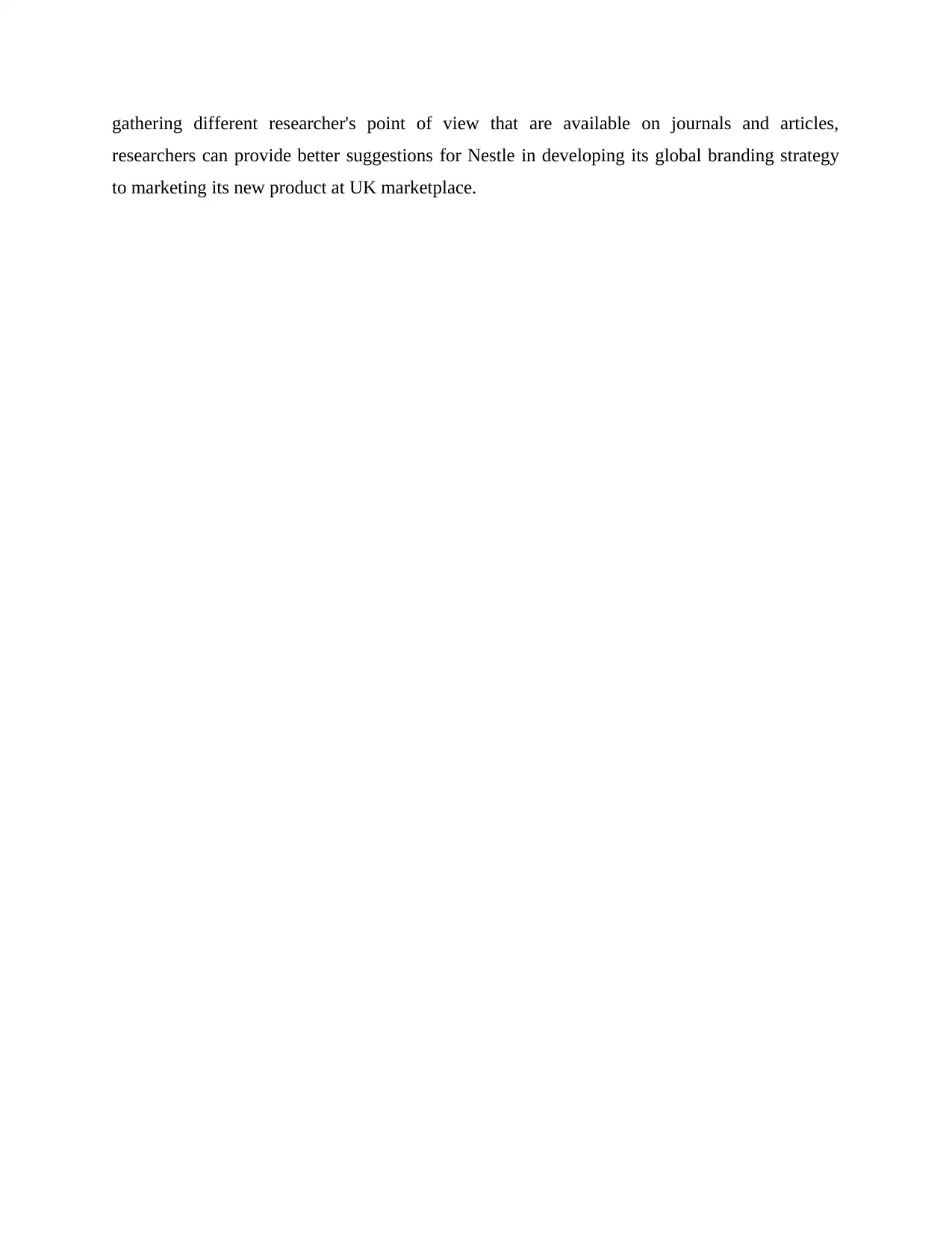
gathering different researcher's point of view that are available on journals and articles,
researchers can provide better suggestions for Nestle in developing its global branding strategy
to marketing its new product at UK marketplace.
researchers can provide better suggestions for Nestle in developing its global branding strategy
to marketing its new product at UK marketplace.
⊘ This is a preview!⊘
Do you want full access?
Subscribe today to unlock all pages.

Trusted by 1+ million students worldwide
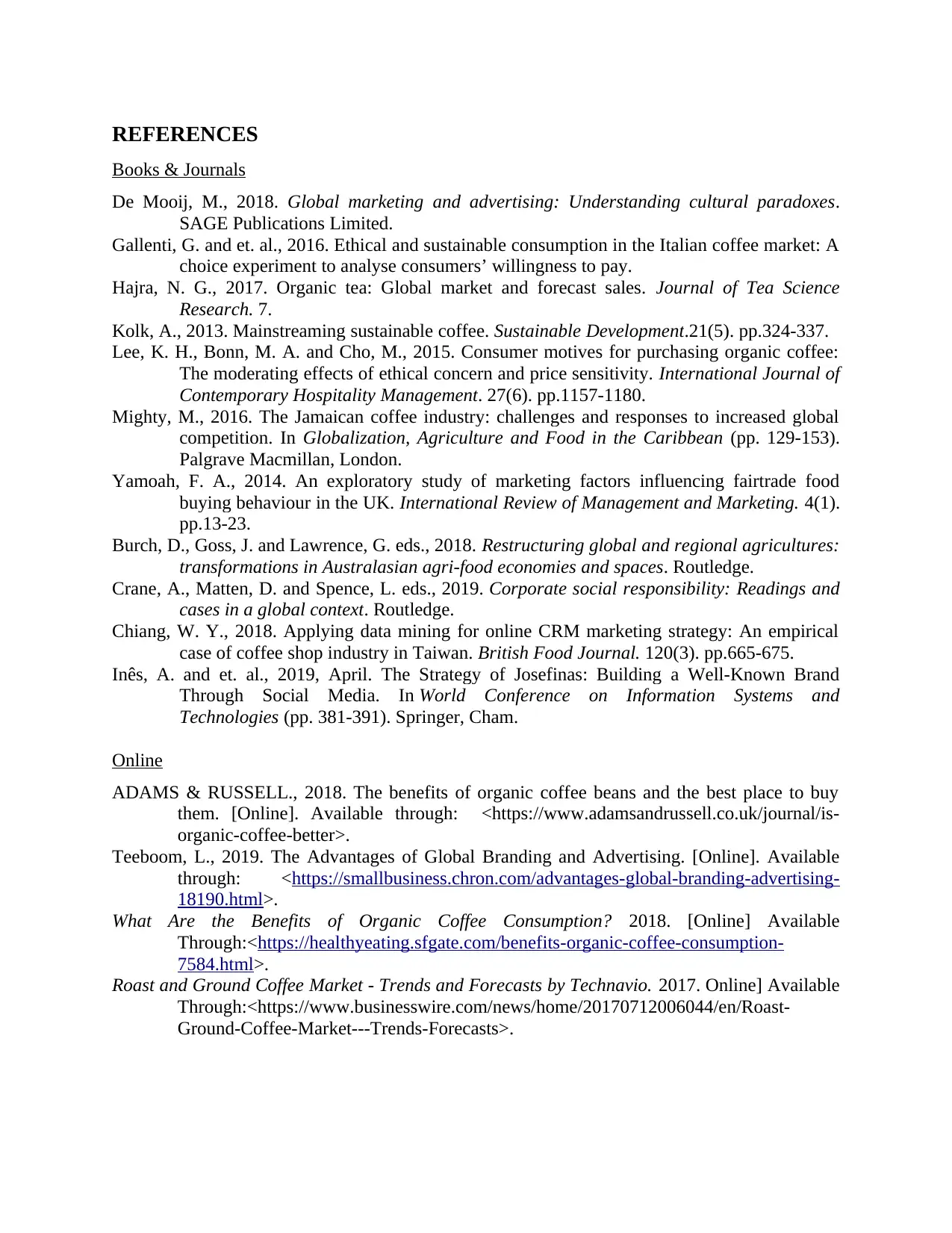
REFERENCES
Books & Journals
De Mooij, M., 2018. Global marketing and advertising: Understanding cultural paradoxes.
SAGE Publications Limited.
Gallenti, G. and et. al., 2016. Ethical and sustainable consumption in the Italian coffee market: A
choice experiment to analyse consumers’ willingness to pay.
Hajra, N. G., 2017. Organic tea: Global market and forecast sales. Journal of Tea Science
Research. 7.
Kolk, A., 2013. Mainstreaming sustainable coffee. Sustainable Development.21(5). pp.324-337.
Lee, K. H., Bonn, M. A. and Cho, M., 2015. Consumer motives for purchasing organic coffee:
The moderating effects of ethical concern and price sensitivity. International Journal of
Contemporary Hospitality Management. 27(6). pp.1157-1180.
Mighty, M., 2016. The Jamaican coffee industry: challenges and responses to increased global
competition. In Globalization, Agriculture and Food in the Caribbean (pp. 129-153).
Palgrave Macmillan, London.
Yamoah, F. A., 2014. An exploratory study of marketing factors influencing fairtrade food
buying behaviour in the UK. International Review of Management and Marketing. 4(1).
pp.13-23.
Burch, D., Goss, J. and Lawrence, G. eds., 2018. Restructuring global and regional agricultures:
transformations in Australasian agri-food economies and spaces. Routledge.
Crane, A., Matten, D. and Spence, L. eds., 2019. Corporate social responsibility: Readings and
cases in a global context. Routledge.
Chiang, W. Y., 2018. Applying data mining for online CRM marketing strategy: An empirical
case of coffee shop industry in Taiwan. British Food Journal. 120(3). pp.665-675.
Inês, A. and et. al., 2019, April. The Strategy of Josefinas: Building a Well-Known Brand
Through Social Media. In World Conference on Information Systems and
Technologies (pp. 381-391). Springer, Cham.
Online
ADAMS & RUSSELL., 2018. The benefits of organic coffee beans and the best place to buy
them. [Online]. Available through: <https://www.adamsandrussell.co.uk/journal/is-
organic-coffee-better>.
Teeboom, L., 2019. The Advantages of Global Branding and Advertising. [Online]. Available
through: <https://smallbusiness.chron.com/advantages-global-branding-advertising-
18190.html>.
What Are the Benefits of Organic Coffee Consumption? 2018. [Online] Available
Through:<https://healthyeating.sfgate.com/benefits-organic-coffee-consumption-
7584.html>.
Roast and Ground Coffee Market - Trends and Forecasts by Technavio. 2017. Online] Available
Through:<https://www.businesswire.com/news/home/20170712006044/en/Roast-
Ground-Coffee-Market---Trends-Forecasts>.
Books & Journals
De Mooij, M., 2018. Global marketing and advertising: Understanding cultural paradoxes.
SAGE Publications Limited.
Gallenti, G. and et. al., 2016. Ethical and sustainable consumption in the Italian coffee market: A
choice experiment to analyse consumers’ willingness to pay.
Hajra, N. G., 2017. Organic tea: Global market and forecast sales. Journal of Tea Science
Research. 7.
Kolk, A., 2013. Mainstreaming sustainable coffee. Sustainable Development.21(5). pp.324-337.
Lee, K. H., Bonn, M. A. and Cho, M., 2015. Consumer motives for purchasing organic coffee:
The moderating effects of ethical concern and price sensitivity. International Journal of
Contemporary Hospitality Management. 27(6). pp.1157-1180.
Mighty, M., 2016. The Jamaican coffee industry: challenges and responses to increased global
competition. In Globalization, Agriculture and Food in the Caribbean (pp. 129-153).
Palgrave Macmillan, London.
Yamoah, F. A., 2014. An exploratory study of marketing factors influencing fairtrade food
buying behaviour in the UK. International Review of Management and Marketing. 4(1).
pp.13-23.
Burch, D., Goss, J. and Lawrence, G. eds., 2018. Restructuring global and regional agricultures:
transformations in Australasian agri-food economies and spaces. Routledge.
Crane, A., Matten, D. and Spence, L. eds., 2019. Corporate social responsibility: Readings and
cases in a global context. Routledge.
Chiang, W. Y., 2018. Applying data mining for online CRM marketing strategy: An empirical
case of coffee shop industry in Taiwan. British Food Journal. 120(3). pp.665-675.
Inês, A. and et. al., 2019, April. The Strategy of Josefinas: Building a Well-Known Brand
Through Social Media. In World Conference on Information Systems and
Technologies (pp. 381-391). Springer, Cham.
Online
ADAMS & RUSSELL., 2018. The benefits of organic coffee beans and the best place to buy
them. [Online]. Available through: <https://www.adamsandrussell.co.uk/journal/is-
organic-coffee-better>.
Teeboom, L., 2019. The Advantages of Global Branding and Advertising. [Online]. Available
through: <https://smallbusiness.chron.com/advantages-global-branding-advertising-
18190.html>.
What Are the Benefits of Organic Coffee Consumption? 2018. [Online] Available
Through:<https://healthyeating.sfgate.com/benefits-organic-coffee-consumption-
7584.html>.
Roast and Ground Coffee Market - Trends and Forecasts by Technavio. 2017. Online] Available
Through:<https://www.businesswire.com/news/home/20170712006044/en/Roast-
Ground-Coffee-Market---Trends-Forecasts>.
Paraphrase This Document
Need a fresh take? Get an instant paraphrase of this document with our AI Paraphraser

9
1 out of 11
Related Documents
Your All-in-One AI-Powered Toolkit for Academic Success.
+13062052269
info@desklib.com
Available 24*7 on WhatsApp / Email
![[object Object]](/_next/static/media/star-bottom.7253800d.svg)
Unlock your academic potential
Copyright © 2020–2026 A2Z Services. All Rights Reserved. Developed and managed by ZUCOL.



